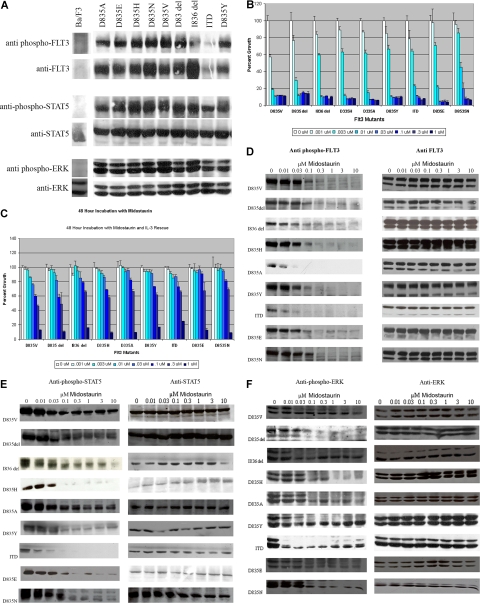Figure 1.
FLT3 activation loop mutants and the effects of midostaurin. (A) FLT3 activation loop mutations result in constitutive activation of FLT3, STAT5, and extracellular stimuli-responsive kinase (ERK). Ba/F3 cells expressing each of the FLT3 mutations were grown in the absence of IL-3. Cell lysates were prepared and the proteins resolved by sodium dodecyl sulfate–polyacrimide gel electrophoresis (SDS-PAGE). Immunoblotting was then performed using the indicated antibodies. (B) Midostaurin inhibits proliferation of Ba/F3 cells expressing FLT3-ITD and activation loop mutations. Ba/F3 cells expressing FLT3-ITD or FLT3 activation loop mutations were incubated with increasing concentrations of midostaurin for 48 hours. The number of viable cells was then determined using a colorimetric assay. Results are expressed as a percentage of viable cells after 48 hours of growth (± SD) in the presence of dimethyl sulfoxide (DMSO) without the drug. (C) Restoration of cellular proliferation by IL-3. The experiment was repeated in the presence of IL-3. Results are again expressed as a percentage of viable cells after 48 hours of growth (± SD) in the presence of DMSO without the drug. (D) Inhibition of FLT3 autophosphorylation by midostaurin. Ba/F3 cells expressing FLT3-ITD or FLT3 activation loop mutations were incubated with increasing concentrations of midostaurin for 20 minutes. Cell lysates were prepared, resolved by SDS-PAGE, then immunoblotted with either anti-phospho-FLT3 antibody or anti-FLT3 antibody, as indicated. (E) Inhibition of STAT5 phosphorylation by midostaurin. Whole cell lysates were prepared and resolved by SDS-PAGE as before, and immunoblotted with anti-phospho-STAT5 or anti-STAT5 antibodies, as indicated. (F) Inhibition of ERK phosphorylation by midostaurin. As before, cell lysates were prepared, resolved by SDS-PAGE, and then probed with anti-phospho–ERK or anti-ERK antibodies, as indicated.

